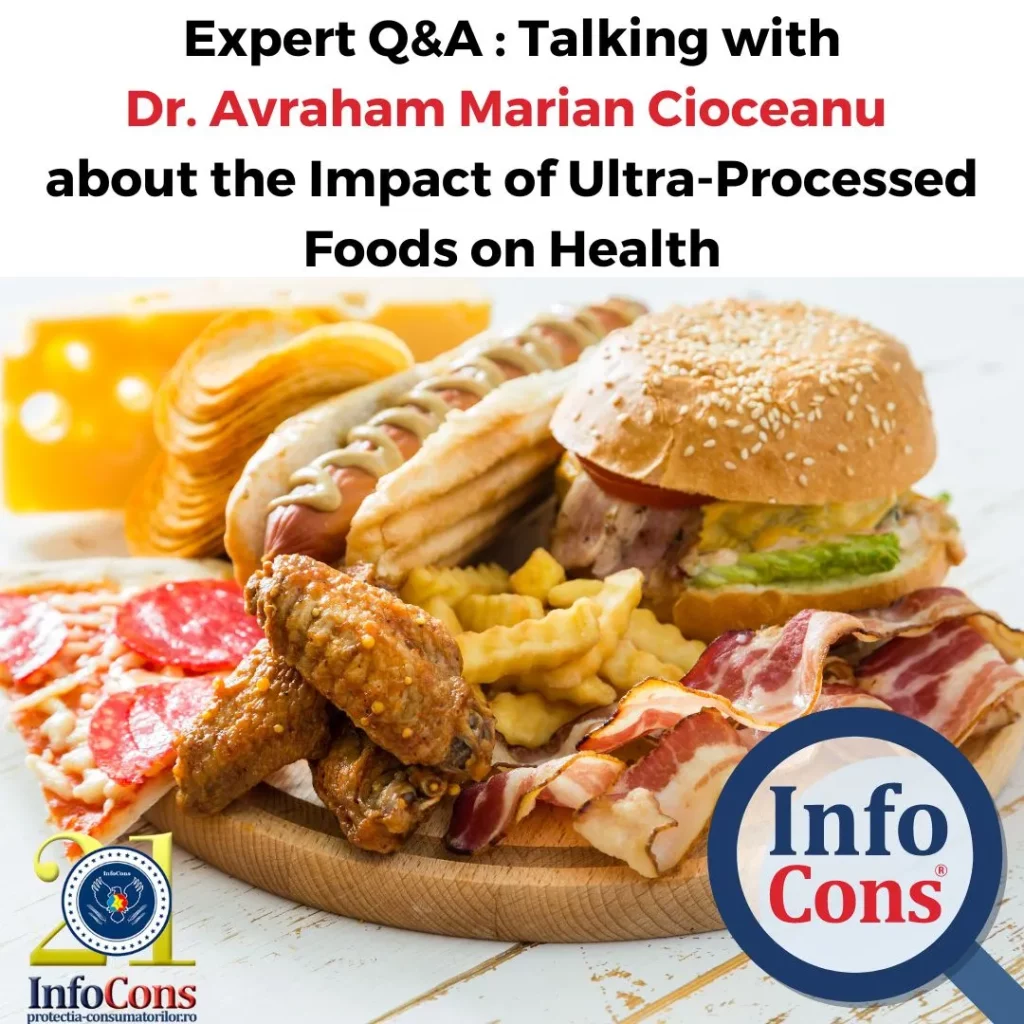
Ultra-processed foods have become a significant part of the modern diet. These foods, characterized by long shelf life, attractive packaging, and low cost, are produced through various industrial processes. Although they are accessible and extremely tasty, experts in the field warn us that their consumption is often linked to numerous health problems.
Designed for quick preparation or consumption, ultra-processed foods are often marketed as time-saving foods, as they include ready-to-eat meals, snacks, and drinks that require minimal cooking time or are already cooked.
We invited Dr. Avraham Marian Cioceanu – President of BIO Romania Association to discuss the topic of ultra-processed foods, a subject that raises many questions and for which we wish to provide informed answers to consumers.
Do you know what Food Additives are ? InfoCons Consumers Protection informs you !
Dr. Avraham Marian Cioceanu, a veterinarian by profession, has served as an advisor to the Minister of Agriculture, General Director of the National Agency for Agricultural Consultancy, and a university lecturer at the Ecological University of Bucharest. He has been a member of the European leadership council of the BIO Association, IFOAM-EU, since 2012 and established Romania‘s first food control laboratory.
The goal of the BIO Romania Association is to promote excellence in the field of organic agriculture to increase competitiveness in this field and achieve sustainable development of the rural environment, as well as to harmonize, represent, and defend the interests of operators in organic agriculture, both nationally and internationally. In the long term, the Association aims to develop its own organic production standard recognized at national and international levels.

Photo source – https://asociatia.bio/
-
“Ultra-processed” can mean many different things, including canned vegetables or various frozen products. What does “ultra-processed” mean from your point of view?
Dr. Avraham Marian Cioceanu: “It’s a very fashionable question, in a negative sense. The good thing is that Romanian consumers are beginning to realize that processing and ultra-processing food is not beneficial for health in general. But before I express my view on the term ‘ultra-processed‘ , I’d like to explain how I classify foods. From my lifetime experience as a veterinarian with various competencies in food control, and my last 16 years as President of the BIO Romania Association, I classify foods as follows:
The first and most important classification, from a food perspective, is that foods are divided into living and dead foods. If we take organic beans, cook them, add oil, tomato sauce, and spices to make a healthy and tasty bean paste, this preparation becomes a dead food. A dead food cannot bring life to the body. Any protein that exceeds 50 degrees Celsius in temperature is altered, degraded, and first loses its enzymes, which are the first to be affected by this thermal treatment. Then, boiling destroys vitamins, leaving only fiber and minerals.
Read also : Pay attention to Alerts for food products with the European InfoCons App !
The living cells of our body need enzymes, vitamins, minerals, fiber, and so on. This is why I consider this to be the most important classification. Studies indicate that, ideally, for a person’s nutrition to maintain health, 80% of their food should be alive, as it comes naturally, like raw fruits and vegetables. Processing means any physical, chemical, or mechanical action applied to a natural food to be used further. This also applies to the method of obtaining bread, flour, etc.
Regarding organic foods, where it’s very well regulated how they are obtained, without synthetic chemicals, without genetically modified seeds, with traceability ensured, inspected, and certified for any product. At the processing level, the only rule imposed is: without synthetic chemicals (no chemical additives). For example, we have organic white bread, which is obtained from a processed ingredient, white flour. A healthy bread is made from whole flour, with all the fiber from the wheat grain preserved in the flour. In white flour, the bran is removed, given to animals, and we eat starch, which in the blood turns into the same glucose as sugar. Starch was once used to stiffen shirts. If we replaced white bread with whole wheat bread, it would be much healthier.
This processing system applies to foods that cannot be otherwise consumed. Like bread, we cannot consume it if we do not process the wheat. This is normal processing. With ultra-processing, it is already something excessive. A bio food that I do not agree with at all, which I consider a deceptive food, is ‘bio yogurt with fruit.’ If we look at the yogurt label, the raw material is organic, but it also contains ‘20% sugar.’ These are usually products intended for children. Giving a child 100 ml of yogurt, of which 20 grams is sugar, disrupts metabolism, as if you were eating about 4 teaspoons of sugar. The fact that it is organic means it does not have those chemicals, chemical compounds, preservatives, colorants, etc., but the addition of sugar to the composition already poses a serious health problem.
In conclusion, processing itself should be done in moderation, with care, and whenever we refer to healthy food, it should be thought of minimally. Ultra-processing means something excessively processed, and we know that excess is not good, processing itself is not good.
Read also : What Fasting Foods Should We Eat During Heatwaves ?
Animal-origin foods are more demanding, more problematic, because they need a thermal regime, always at 0-5 degrees or below, to be safely stored. If the power goes out in a meat warehouse, and the temperature rises to 15-20 degrees for more than a day, that meat is compromised. This does not happen with vegetables, fruits, or cereals.
If we refer to cold cuts, like sausages, for example, and look at the label, we might find 93% pork. In my view, this is deception because this percentage of meat turns into 14 grams of protein. And I say this because meat means protein. And from here, the labeling part is a chapter where the law is not exactly respected, which can mean deception. It is also difficult for authorities to identify out of hundreds, thousands of additives, how many are found in a product, which means that thousands of analyses would be necessary to accurately identify how many additives are in a cold cut.
Read also : What Do Food Labels Reveal? Why Is It Important to Read Them Carefully?
In cold cuts, instead of meat, they add skins, cartilage, and working meat, and they add colorants, flavors. When we consume such ultra-processed foods, like cold cuts, which no longer have any connection to what is found in nature, the immune system activates and fights against those chemical elements that reach our blood, are not recognized by the body, and thus the immune system becomes hyperactivated, leading to allergies, intolerances, autoimmune diseases, in very large percentages. The age at which these conditions begin to manifest is decreasing. The main cause remains a diet that uses a lot of chemicals not recognized by the human body.”
-
What are the health risks for people who consume ultra-processed foods ?
Dr. Avraham Marian Cioceanu : “Everything that means nutritional diseases, including diseases of the digestive system, especially liver, pancreas, and from here we reach diabetes, cancer. There are studies showing that the pancreas is responsible for a large percentage of chronic diseases like cancer. The pancreas is overwhelmed by high concentrations of sugar or carbohydrates, gradually affecting it. If blood sugar levels are not kept constant and normal for the body, the conditions that appear over the years gradually degrade tissues and organs.
Diabetes is a systemic disease; it can lead to impaired vision, amputation of fingers or limbs, affected blood circulation, because in the first stage it gives no sign, it does not manifest with pain. We reach the doctor when it may be too late. From diabetes, a multitude of diseases can arise, all stemming from an inadequate diet.”
-
What do you consider to be the biggest traps on the label of an ultra-processed product? Here we can think of ‘clean label‘ or ‘no added sugar.’
Dr. Avraham Marian Cioceanu : “There is a labeling law that some producers do not respect, in the case of conventional products. As I mentioned about the sausages with 93% meat. There are mandatory elements like ingredients, manufacturer, manufacturer’s address, expiration date, storage conditions, and others.
Do you want to learn more about Bisphenol A and phthalates in food packaging ? InfoCons Consumers Protection informs you !
The clean label, if we refer to the raw material being without additives, pesticides, without colorants. In Romania, these are harmonized with European Union legislation, and we have an authority that deals with and is responsible for labeling all products sold in our country. And in my opinion, the activity of this authority should be intensified because that example I encountered with those sausages seems flagrant to me, to say that you have 93% pork and 14% protein.
If we take and analyze the European regulation for the labeling of conventional foods and analyze the legislation in Romania, it is comprehensive, correct, sufficient. If there is no one to ensure that those labeling rules are respected, these problems we may encounter arise.
For organic products, there is a special labeling law, which, in addition to all the rules imposed by the conventional food labeling law, has some special rules for organic food . There must be that European organic food logo, under this logo there must be a code (the first 2 letters are the country’s initial, in our case RO, and another 3-digit number indicating the number of the inspection and certification body that certified the producer) and the third element is the word ECO or BIO mandatory.
After the producer creates a new organic product and proposes the labeling, it is sent to the inspection and certification body that certified it, which checks if the label meets all the labeling requirements for organic food, and if it does, gives the producer approval to use that label. Any non-conformity is reported and corrected by this body. For these reasons, an organic product is easier to verify whether it is fake or not.
Read also : EU’s Ecodesign for Sustainable Products Regulation and what we should know about it
In Romania, for many years, analyzing products from supermarkets, boutiques, grocery stores, online shops, I have not found a mislabeled food. If at the market it says ‘bio tomatoes’ on a piece of cardboard, that means nothing if they do not have the mandatory elements on the label : the European organic food logo, the code of the inspection and certification body. In the supermarket, you cannot encounter fake organic food because, from the warehouse where it is stored, it undergoes verification before being placed on the shelf, and an organic food cannot be sold unless all labeling rules are respected.”
Article written by Cosmina Nițu
Master’s degree in nutrition and diversification consultant
Translated from Romanian by Andra Nițu
Master’s degree in communication sciences
InfoCons – European Organization for Consumer Protection and Promotion of Programs and Strategies , a full member of the World Organization Consumers International , founding member of the Federation of Consumer Associations , and member of ANEC .